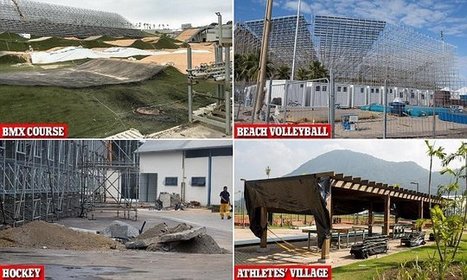It's ITFs rule where she's committed to participate in minimum 2 fedcup matches for Denmark - she only played one and was going to Egypt with the team when she got injured so badly with her ankle that she couldn't travel. You know she's been out for three months because of that. Good with some common sense as HellBells write
Rio Olympics Tennis Talk
- Thread starter britbox
- Start date
You are using an out of date browser. It may not display this or other websites correctly.
You should upgrade or use an alternative browser.
You should upgrade or use an alternative browser.
- Status
- Not open for further replies.
Moxie
Multiple Major Winner
- Joined
- Apr 14, 2013
- Messages
- 44,351
- Reactions
- 15,403
- Points
- 113
It seems that the Danish Tennis Federation appealed to the ITF and exemption was granted. I agree with @Hoergren and @HellsBells that this seems fair, since the intention was to participate, and she was hampered by injury.
http://www.reuters.com/article/us-olympics-tennis-field-idUSKCN0ZG28C
This article says that Nadal has also won provisional entry, but has to play the next DC tie for Spain. Sharapova is out. I used to accept the idea of the ITF forcing Fed Cup/Davis Cup participation as a condition to entry in the OG, in theory, but Wozniaki's case has made me question why the ITF should trump a country's own Olympic committee's choices as to who they want to send to represent their country. I no longer see it as fair. It's really a strong arm method of forcing players into team tennis. Wozniaki is the most prominent athlete in Denmark. Why would it even be a question that the Danish OC would send her to the Olympics, if they saw fit?
http://www.reuters.com/article/us-olympics-tennis-field-idUSKCN0ZG28C
This article says that Nadal has also won provisional entry, but has to play the next DC tie for Spain. Sharapova is out. I used to accept the idea of the ITF forcing Fed Cup/Davis Cup participation as a condition to entry in the OG, in theory, but Wozniaki's case has made me question why the ITF should trump a country's own Olympic committee's choices as to who they want to send to represent their country. I no longer see it as fair. It's really a strong arm method of forcing players into team tennis. Wozniaki is the most prominent athlete in Denmark. Why would it even be a question that the Danish OC would send her to the Olympics, if they saw fit?
It seems that the Danish Tennis Federation appealed to the ITF and exemption was granted. I agree with @Hoergren and @HellsBells that this seems fair, since the intention was to participate, and she was hampered by injury.
http://www.reuters.com/article/us-olympics-tennis-field-idUSKCN0ZG28C
This article says that Nadal has also won provisional entry, but has to play the next DC tie for Spain. Sharapova is out. I used to accept the idea of the ITF forcing Fed Cup/Davis Cup participation as a condition to entry in the OG, in theory, but Wozniaki's case has made me question why the ITF should trump a country's own Olympic committee's choices as to who they want to send to represent their country. I no longer see it as fair. It's really a strong arm method of forcing players into team tennis. Wozniaki is the most prominent athlete in Denmark. Why would it even be a question that the Danish OC would send her to the Olympics, if they saw fit?
Yeah, I'm glad she's in. It would have been out of the spirit of the Olympics if she was forced out because of of previous injuries.
France have confirmed their seven strong team for Rio:

Men
Richard Gasquet, Jo-Wilfried Tsonga, Gael Monfils, Gilles Simon
Women
Caroline Garcia, Kristina Mladenovic, Alizé Cornet
They have also Nicholas Mahut and Pierre-Hugues Herbert tabbed for the doubles, but they haven't officially qualified yet.

Men
Richard Gasquet, Jo-Wilfried Tsonga, Gael Monfils, Gilles Simon
Women
Caroline Garcia, Kristina Mladenovic, Alizé Cornet
They have also Nicholas Mahut and Pierre-Hugues Herbert tabbed for the doubles, but they haven't officially qualified yet.
Rio Olympics venues far from complete with just 5 weeks to go

Olympic organizers are battling to save the $10 billion Rio Games from fiasco, Daily Mail Online can reveal. Venues are unfinished and a key transport link will not be completed.
http://www.dailymail.co.uk/news/art...nstruction-s-without-taking-Zika-account.html
---
The tennis stadium is ready but it looks like there could be issues with the transport infrastructure.

Olympic organizers are battling to save the $10 billion Rio Games from fiasco, Daily Mail Online can reveal. Venues are unfinished and a key transport link will not be completed.
http://www.dailymail.co.uk/news/art...nstruction-s-without-taking-Zika-account.html
---
The tennis stadium is ready but it looks like there could be issues with the transport infrastructure.
Rio 2016: Thanasi Kokkinakis, John Millman to represent Australia as Kyrgios, Tomic skip
From www.vavel.com - Today, 2:40 PM

Without their two stars, Australia will rely on both Millman and Kokkinakis to play the role of spoiler throughout the tournament.
Link: http://www.vavel.com/en-us/tennis-u...epresent-australia-as-kyrgios-tomic-skip.html
From www.vavel.com - Today, 2:40 PM

Without their two stars, Australia will rely on both Millman and Kokkinakis to play the role of spoiler throughout the tournament.
Link: http://www.vavel.com/en-us/tennis-u...epresent-australia-as-kyrgios-tomic-skip.html
Rio 2016: David Ferrer, Roberto Bautista Agut headline Spain's team as Nadal awaits an appeal
From www.vavel.com - Today, 2:39 PM

While they await the appeal of their star man Rafael Nadal, Spain still bring two men to the men's singles field who hope to make some noise in Rio.
Link: http://www.vavel.com/en-us/tennis-u...ne-spains-team-as-nadal-awaits-an-appeal.html
From www.vavel.com - Today, 2:39 PM

While they await the appeal of their star man Rafael Nadal, Spain still bring two men to the men's singles field who hope to make some noise in Rio.
Link: http://www.vavel.com/en-us/tennis-u...ne-spains-team-as-nadal-awaits-an-appeal.html
mrzz
Hater
- Joined
- Apr 14, 2013
- Messages
- 6,569
- Reactions
- 3,528
- Points
- 113
Rio Olympics venues far from complete with just 5 weeks to go

Olympic organizers are battling to save the $10 billion Rio Games from fiasco, Daily Mail Online can reveal. Venues are unfinished and a key transport link will not be completed.
http://www.dailymail.co.uk/news/art...nstruction-s-without-taking-Zika-account.html
---
The tennis stadium is ready but it looks like there could be issues with the transport infrastructure.
I go to Rio almost every week and, yes, the city is a mess.
But the games will take place, almost normally. Things will be ready, for three times the price. The local population is going to pay for everything, not only money-wise. For example, at most of the time the subway will be closed for the normal population, and only used for the "Olympic family"... (If I was a Rio resident, I would go to the street and protest, cause riot and burn everything Olympic related that I see...)
I go to Rio almost every week and, yes, the city is a mess.
But the games will take place, almost normally. Things will be ready, for three times the price. The local population is going to pay for everything, not only money-wise. For example, at most of the time the subway will be closed for the normal population, and only used for the "Olympic family"... (If I was a Rio resident, I would go to the street and protest, cause riot and burn everything Olympic related that I see...)
Wow. You wonder if hosting these things are actually worth it... I remember reading how many workers have died getting Quatar ready for a world cup... I'd be pretty pissed if I was a Rio resident too.
mrzz
Hater
- Joined
- Apr 14, 2013
- Messages
- 6,569
- Reactions
- 3,528
- Points
- 113
@masterclass , I will answer your question about Rio here, just to keep the threads organized. See some previous posts here on the same matter.
I am from São Paulo but I go to Rio every other week due to work, so I can give a good insight, I guess.
Everything that you mentioned is true, at least to some extent. However, context is a bit necessary. Brazilians, and cariocas (carioca is someone born on Rio de Janeiro state) are used to confusion and mess. So, yes, most things are late, I don´t doubt they will be giving the last turn of the screws when people are starting to fill their sits, but I guess it will be just enough to avoid a huge public embarrassment. That´s the usual Brazilian way. World cup wasn´t much different.
But this time somethings add to the add. First there is the political factor. The country is heavily divided, and beyond the political issues there is a institutional crisis going on. The political factor was already in place at the world cup (even if the institutional one wasn´t).
Then there´s the economical/financial aspect. It is related to the world economy in a sense, (Rio de Janeiro is a state which exports oil, for example, and have suffered with fall in prices), but it has a lot of internal factors. The currently removed president, which party was in power since 2002, has a social policy which spends a lot. States within the republic (as Rio) are extremely incompetent to deal with their finances, and often rely on the central government to help them. This time things were not so simple. Emergency credits were given this last week.
And finally there´s Zika and other health issues. They are real, even if I am not sure how can I quantify it. I go to Rio a lot, and I do not take any special care, as I do not take here in SP. But maybe we are more used to this kind of situation.
My advice to anyone coming to Rio, or Brazil in general, is the same I would give in any other time. Take care, and respect the borders of the unspoken territories. Violence (and all sorts of problems) is not homogeneously spread. I live in a part of São Paulo where crime statistics are ok, robbery is a problem but violent crimes are rare. 10 miles to the south and we have war zone statistics. This kind of contrast is the signature of Brazil.
I am from São Paulo but I go to Rio every other week due to work, so I can give a good insight, I guess.
Everything that you mentioned is true, at least to some extent. However, context is a bit necessary. Brazilians, and cariocas (carioca is someone born on Rio de Janeiro state) are used to confusion and mess. So, yes, most things are late, I don´t doubt they will be giving the last turn of the screws when people are starting to fill their sits, but I guess it will be just enough to avoid a huge public embarrassment. That´s the usual Brazilian way. World cup wasn´t much different.
But this time somethings add to the add. First there is the political factor. The country is heavily divided, and beyond the political issues there is a institutional crisis going on. The political factor was already in place at the world cup (even if the institutional one wasn´t).
Then there´s the economical/financial aspect. It is related to the world economy in a sense, (Rio de Janeiro is a state which exports oil, for example, and have suffered with fall in prices), but it has a lot of internal factors. The currently removed president, which party was in power since 2002, has a social policy which spends a lot. States within the republic (as Rio) are extremely incompetent to deal with their finances, and often rely on the central government to help them. This time things were not so simple. Emergency credits were given this last week.
And finally there´s Zika and other health issues. They are real, even if I am not sure how can I quantify it. I go to Rio a lot, and I do not take any special care, as I do not take here in SP. But maybe we are more used to this kind of situation.
My advice to anyone coming to Rio, or Brazil in general, is the same I would give in any other time. Take care, and respect the borders of the unspoken territories. Violence (and all sorts of problems) is not homogeneously spread. I live in a part of São Paulo where crime statistics are ok, robbery is a problem but violent crimes are rare. 10 miles to the south and we have war zone statistics. This kind of contrast is the signature of Brazil.
masterclass
Masters Champion
- Joined
- Jul 15, 2013
- Messages
- 652
- Reactions
- 246
- Points
- 43
@mrzz, I'm very grateful for your interesting and informative perspective in the correct thread!. Thanks so much. Brazil has so much in natural resources (not only oil of course) and its people, with the right people running things I'm confident they will find a way to improve the situation. In macro perspective, things tend to be cyclical.
Appreciatively,
masterclass
Appreciatively,
masterclass
mrzz
Hater
- Joined
- Apr 14, 2013
- Messages
- 6,569
- Reactions
- 3,528
- Points
- 113
Girls, boys... I´m in Rio right now and I must say I have a bad feeling about this...
My gut feeling is that it will be a complete chaos (it is quite a mess already). On the other hand, talking to a friend who lives here for almost ten years, he remind me of how much Rio is able to deal with chaos. He told me what happened some years ago, when Rio hosted a religious event (World Youth Day), for which literally millions of people came. There were torrential rain for a week, and because of that they changed the place of the main event ONE DAY before the event.
Chaos? No. Nothing happened. As he said, ´this is Rio´.
Having said that, I am still very happy to know that I will be far away from here. With the Brazilian very porous borders, anything can happen.
My gut feeling is that it will be a complete chaos (it is quite a mess already). On the other hand, talking to a friend who lives here for almost ten years, he remind me of how much Rio is able to deal with chaos. He told me what happened some years ago, when Rio hosted a religious event (World Youth Day), for which literally millions of people came. There were torrential rain for a week, and because of that they changed the place of the main event ONE DAY before the event.
Chaos? No. Nothing happened. As he said, ´this is Rio´.
Having said that, I am still very happy to know that I will be far away from here. With the Brazilian very porous borders, anything can happen.
Federberg
The GOAT
- Joined
- Apr 22, 2013
- Messages
- 15,848
- Reactions
- 5,891
- Points
- 113
@masterclass , I will answer your question about Rio here, just to keep the threads organized. See some previous posts here on the same matter.
I am from São Paulo but I go to Rio every other week due to work, so I can give a good insight, I guess.
Everything that you mentioned is true, at least to some extent. However, context is a bit necessary. Brazilians, and cariocas (carioca is someone born on Rio de Janeiro state) are used to confusion and mess. So, yes, most things are late, I don´t doubt they will be giving the last turn of the screws when people are starting to fill their sits, but I guess it will be just enough to avoid a huge public embarrassment. That´s the usual Brazilian way. World cup wasn´t much different.
But this time somethings add to the add. First there is the political factor. The country is heavily divided, and beyond the political issues there is a institutional crisis going on. The political factor was already in place at the world cup (even if the institutional one wasn´t).
Then there´s the economical/financial aspect. It is related to the world economy in a sense, (Rio de Janeiro is a state which exports oil, for example, and have suffered with fall in prices), but it has a lot of internal factors. The currently removed president, which party was in power since 2002, has a social policy which spends a lot. States within the republic (as Rio) are extremely incompetent to deal with their finances, and often rely on the central government to help them. This time things were not so simple. Emergency credits were given this last week.
And finally there´s Zika and other health issues. They are real, even if I am not sure how can I quantify it. I go to Rio a lot, and I do not take any special care, as I do not take here in SP. But maybe we are more used to this kind of situation.
My advice to anyone coming to Rio, or Brazil in general, is the same I would give in any other time. Take care, and respect the borders of the unspoken territories. Violence (and all sorts of problems) is not homogeneously spread. I live in a part of São Paulo where crime statistics are ok, robbery is a problem but violent crimes are rare. 10 miles to the south and we have war zone statistics. This kind of contrast is the signature of Brazil.
I remember the first time I went to Rio. I was staying in a hotel in Ipanema, and I had gone on a tour of one of the favelas. I got to chatting with some people there and they told me about a night club (or maybe it was just a bar, long time ago..) in the favela that would be really good later. So when I got back to the hotel and told the people at reception to get me a taxi for the evening so that I could go to the club, they freaked. But we insisted and we had a great time There's danger everywhere, just have to use good judgement and keep your wits about you
mrzz
Hater
- Joined
- Apr 14, 2013
- Messages
- 6,569
- Reactions
- 3,528
- Points
- 113
I remember the first time I went to Rio. I was staying in a hotel in Ipanema, and I had gone on a tour of one of the favelas. I got to chatting with some people there and they told me about a night club (or maybe it was just a bar, long time ago..) in the favela that would be really good later. So when I got back to the hotel and told the people at reception to get me a taxi for the evening so that I could go to the club, they freaked. But we insisted and we had a great time There's danger everywhere, just have to use good judgement and keep your wits about you
I´m glad you made it! For sure I agree with you that good judgment is most important thing, however, there are two things I would like to point out:
1) One could try Russian roulette, survive and still say "see, there was no risk at all". I know you pointed out the danger, but this kind of story sometimes induces people who does not clearly understand what "risk" and "danger" is that some places and things are safe, while they are not.
2) Keep in mind that there´s an informal tourism industry in the favelas. I would guess that you were not the first, neither the only nor the last "gringo" there. There is surely an unwritten law (by the organized crime) not to touch "gringos" on those particular places, as they need them (in this case, you) to keep business going. There are a lot of people who have interest in keeping this image that the favelas are a happy and friendly place, and having some foreigners with stories like yours are extremely efficient way to do it, as such stories seem to counterbalance the horrific crime statistics that the favelas actually have.
Moxie
Multiple Major Winner
- Joined
- Apr 14, 2013
- Messages
- 44,351
- Reactions
- 15,403
- Points
- 113
Also Karolina Plishkova.Raonic, Berdych and Simona Halep have all pulled out over Zika virus concerns.
Looks like Genie Bouchard might be next in line to skip Rio.
http://discuss.tennis/threads/genie-talks-washington-olympics-and-more.829/
@mrzz - what sort of coverage are these withdrawals getting in Brasil?
http://discuss.tennis/threads/genie-talks-washington-olympics-and-more.829/
@mrzz - what sort of coverage are these withdrawals getting in Brasil?
- Status
- Not open for further replies.
| Thread starter | Similar threads | Forum | Replies | Date |
|---|---|---|---|---|
|
|
Rio Open, Brazil, 2020 - ATP 500 | Pro Tennis (Mens) | 35 | |
|
|
Rio Open 2019, Brazil, ATP 500 | Pro Tennis (Mens) | 63 | |
|
|
Rio Olympics Official Thread - Men's Tennis | Pro Tennis (Mens) | 530 | |
|
|
RIO OLYMPICS 2016 | Pro Tennis (Mens) | 501 | |
|
|
ATP Ranking Points for Rio Olympics? ITF says Nada | Pro Tennis (Mens) | 9 |

